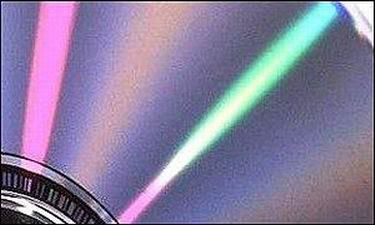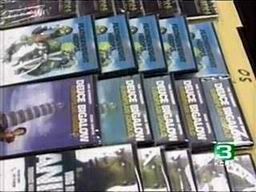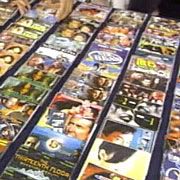Boss, dibidi?

dibidi (dē'bē-dē')
n. 1. Filipino term for an optical digital disc containing video, illegally reproduced and sold at bargain prices on the street. 2. A corrupted pronunciation of the acronym DVD. Piracy in the movie industry has been rampant for the longest time now, particularly here, in this third world country I call home. You want a copy of the latest movie on DVD? Chances are, a vendor near your place can fix you up, for a fraction of the price of the real deal. If you're the naive type who can't tell the difference between a dibidi vendor and a cigarette vendor, all you have to do is spot those people carrying binders with transparent sleeves holding the labels of their wares. If you have your doubts, just stand still, and it's almost a certainty that one of these people will approach you with the standard sales pitch: boss, dibidi? If you look horny, maybe you'll get the other pitch: boss, x?
Piracy in the movie industry has been rampant for the longest time now, particularly here, in this third world country I call home. You want a copy of the latest movie on DVD? Chances are, a vendor near your place can fix you up, for a fraction of the price of the real deal. If you're the naive type who can't tell the difference between a dibidi vendor and a cigarette vendor, all you have to do is spot those people carrying binders with transparent sleeves holding the labels of their wares. If you have your doubts, just stand still, and it's almost a certainty that one of these people will approach you with the standard sales pitch: boss, dibidi? If you look horny, maybe you'll get the other pitch: boss, x?
This phenomenon has bred an underground culture of sorts, versed in the lingo of pirated movie DVDs. There are DVD copies, actual reproductions of DVD releases, complete with all the special features. There are promo copies, clear in every way but lacking the special features, and sometimes with a "property of xxx studios" or "for awards consideration purposes only" message on the bottom of the screen. And sometimes you come across blurred copies simply referred to by the vendor as malabong kopya. You know the kind, the one in which the colors and sound are washed out, maybe the camera shakes, and in the worst ones you see shadows of people walking at the bottom of the screen. These are typically made by people who actually go through the effort of bringing in a video camera in a theater and recording the entire movie, then later transferring the recorded video to disc.
Why do people buy pirated DVDs? It's pretty simple actually. First and foremost, it's because of economics. A bootleg DVD can cost anywhere from 60-120 pesos (about 1-2 USD) depending on where you buy one. The genuine article costs somewhere from 350-1,000 pesos (about 6-18 USD), which is six to eighteen times more expensive than the pirated ones. Unless you're a member of the elite class, it's highly unlikely that you can afford to purchase original DVDs on a regular basis. And even assuming that you can afford to buy the real thing, if the the bootleg copy is just as good, why would you want to buy an original, particularly if you'll just watch it once, then slip it on your shelf to gather dust?
Interestingly enough, watching a pirated DVD is even cheaper that watching a movie in a theater. With ticket prices ranging from 50-150 pesos (about 1-3 USD) not including snacks, drinks, and the cost of going to and from the theater, it's a lot less expensive to shell out the dough for a bootleg disc and watching the thing at home.
But you may be surprised to know that economics is not the only reason. The fact that a lot of the regular customers of dibidi vendors drive up in their Bimmers, Benzes, Volvos or fancy SUVs clearly indicate that even the well-heeled have no compunctions over buying fake discs.
Dibidi vendors often have a more comprehensive catalog of titles than the typical video retail outlet. They frequently have in stock some of the more obscure titles and hard-to-find series compilations. And if they don't have it, if you order it they'll have it ready for you the next day. I've personally found some difficult to find titles this way. An example is the Faces Of Death series that I have never seen offered for sale on retail.
The pirates are, strangely enough, more efficient than their legitimate counterparts. A movie is typically released on DVD at least several weeks after it is released in theaters. Pirated DVD movies are oftentimes offered for sale by vendors even before the movie is shown in theaters locally. So in a nutshell, bootleg discs, if you know how to choose, are just as clear as the real ones. They're a lot cheaper, there are a lot more titles to choose from, and the selections are more up to date. With all these advantages, why would anyone want to buy original DVDs?
So in a nutshell, bootleg discs, if you know how to choose, are just as clear as the real ones. They're a lot cheaper, there are a lot more titles to choose from, and the selections are more up to date. With all these advantages, why would anyone want to buy original DVDs?
Before anything else, lest you mistake my motives, I am not advocating DVD piracy. It is immoral and illegal plain and simple. Yet it proliferates. And somehow the efforts of Edu Manzano and the Optical Media Board can't seem to make a dent in this trade.
Why is that?
If I may be so bold, it is my belief that it is the local video industry, along with its foreign counterparts, which has brought the bane of movie piracy upon itself. It has chosen to follow the American business model of selling movies on DVD at exorbitant prices, out of the reach of the typical Filipino. Case in point: about 30% of Filipinos are below the poverty line, and 15% live in hunger. 10% of the workforce cannot find jobs while 17% don't have regular sources of income. And the clincher is, the per capita income here in the Philippines comes to about 700 USD. In the United States it's about 22,000 USD.
To cut a long story short, selling original DVDs at prices almost the same as those offered for sale in the U.S. market is a major faux pas. And while prices of genuine DVDs have gone down significantly over the past few years, it still has to go down further in order to compete with bootleg copies.
Secondly, the local video industry has to improve its selection of titles. A lot of popular titles, particulaly series compilations, are almost impossible to find on original DVD, yet are easy to find on dibidi catalogs.
Lastly, the local video industry has to be more prompt in releasing new titles. Barring restrictions on the release of movies on DVD or other video media during it's theater run, they still should be able to release movies on video not long after being shown in theaters.
Clearly, while the pirated DVD trade is illegal, it seems that it is not without its virtues.
To sum it all up, if the prices of original DVDs are lowered to make them more competetive with pirated discs, if the selections are made broader and new releases made available promptly, I see no reason why bootleg discs won't die out. It's because of the greed of the humongous movie studios, their desire to milk the most cash out of a movie release by selling copies of it at high prices, especially by third world standards, which are basically pushing people to buy the fake discs instead. And who can blame them.
The bottomline is, while DVD piracy is obviously a crime, there are probably more constructive ways of dealing with this problem than just resorting to police raids on bootleg DVD lairs and arresting small-time vendors. As long as there is a market for it, there will always be people who will sell them (just like prostitution, the oldest profession). Reducing the supply only drives up the demand. If you eliminate the demand by promoting genuine discs as a viable alternative, I have no doubt bootleg disc industry would fall in on itself.
I guess we can surmise that video piracy is the karma big movie companies get for being greedy.
Comments
to be honest, i am not too bothered with pirated dvds of foreign movies. foreign companies are already rich. what i'm quite bothered with are pirated dvds/cds of our local movies and artists because it is our own local movie/recording industry that's affected. eventually if this goes unabated the greatest loser will be no one but us.
Rain: Yeah, piracy at the very least equalizes access to entertainment. Not only the wealthy can see the latest releases, but also the poor.
Ka Uro: You're right on that point. Would you believe a day or two after Manny Pacquiao's victory over Erik Morales, the fight was being already sold on bootleg DVDs. While Manny may have been well rewarded for his winning match, a lot of small-time studios are losing money to piracy. The big companies may be able to survive the loss of potential revenue, but smaller studios can't.
Not only are local movies affected, even the small independent film makers from abroad are affected as well. That's why virtually all of the movies released nowadays come only from the major studios only.
I'm actually split over this issue. While piracy is wrong and illegal, it is without a doubt advantageous in some other regard as previously explained.
I leave it up to the reader to come up with his or her own decision with regard to this matter.
we have the same situation in Malaysia... and despite a "crackdown" by the "authorities", these pirated DVDs are still available... if nothing else, this crackdown helped drive prices back up a bit, so it actually benefitted the pirate vendors a bit!
And yeah, while I think pirating the movies etc is legally wrong, I think prices for originals are totally outrageous. Don't have an easy solution to the problem...
The only solution I know thats sure to work is if they lower prices of original discs to be competetive with bootleg ones. Save for that, no crackdown will be enough to totally eradicate video piracy as their will always be demand for cheap DVDs. :-)
Thanks for commenting. :-)
idiotboard.blogspot.com
for me, i'd rather choose the lesser evil, and that's bootleg DVD. at least, buying it is not like i cheated on the elections, or spilled oil on the ocean, or stabbed someone on the street, or lied to my friends or whatever.
it's a simple play of economics and i will not be a martyr to some abstract morality play just so i will feel all warm and fuzzy that i didn't give in to temptation of buying a pirated dvd!
I guess that's three points in favor and none against. :-)
I used to get warm and fuzzy feelings before, and then I realized it was peripheral neuropathy caused by lack of vitamins. :-)